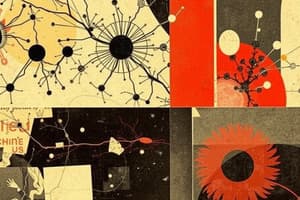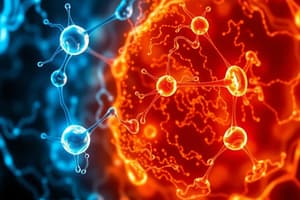Podcast
Questions and Answers
What is the primary function of cyclin proteins in the cell cycle?
What is the primary function of cyclin proteins in the cell cycle?
- To initiate DNA replication
- To regulate the cell cycle by binding to CDK (correct)
- To monitor the cell cycle for DNA damage
- To induce apoptosis
At which stage of the cell cycle does the binding of cyclin to CDK initiate protein synthesis?
At which stage of the cell cycle does the binding of cyclin to CDK initiate protein synthesis?
- G1 phase
- G2 phase (correct)
- Mitosis
- S phase
What is the purpose of checkpoints in the cell cycle?
What is the purpose of checkpoints in the cell cycle?
- To initiate DNA replication
- To slow down the cell cycle
- To induce apoptosis
- To monitor the cell cycle for errors (correct)
What is the result of uncontrolled cell growth and division?
What is the result of uncontrolled cell growth and division?
What is a characteristic of cancer cells compared to normal cells?
What is a characteristic of cancer cells compared to normal cells?
What can cause the occurrence of cancer cells?
What can cause the occurrence of cancer cells?
What is the consequence of unregulated cell growth and division?
What is the consequence of unregulated cell growth and division?
What is the role of CDK in the cell cycle?
What is the role of CDK in the cell cycle?
What is the primary mechanism that ensures the regulation of the normal cell cycle?
What is the primary mechanism that ensures the regulation of the normal cell cycle?
During which stage of the cell cycle does the binding of cyclin to CDK signal the initiation of DNA replication?
During which stage of the cell cycle does the binding of cyclin to CDK signal the initiation of DNA replication?
What is the consequence of a failure in the regulation of the cell cycle?
What is the consequence of a failure in the regulation of the cell cycle?
What is the primary difference between cancer cells and normal cells in terms of their cell cycle?
What is the primary difference between cancer cells and normal cells in terms of their cell cycle?
What is the purpose of the checkpoint at the end of the G1 phase?
What is the purpose of the checkpoint at the end of the G1 phase?
What is the result of cancer cells crowding out normal cells?
What is the result of cancer cells crowding out normal cells?
What is the primary characteristic of cancer cells in terms of their growth and division?
What is the primary characteristic of cancer cells in terms of their growth and division?
What is the role of environmental factors in the occurrence of cancer cells?
What is the role of environmental factors in the occurrence of cancer cells?
What is the primary mechanism that ensures the quality of DNA replication during the cell cycle?
What is the primary mechanism that ensures the quality of DNA replication during the cell cycle?
What is the consequence of a failure in the quality control checkpoints during the cell cycle?
What is the consequence of a failure in the quality control checkpoints during the cell cycle?
Flashcards are hidden until you start studying
Study Notes
Cell Cycle Regulation
- Cell division rate varies depending on cell type
- Proteins and enzymes control the cell cycle
- Cyclin proteins regulate the normal cell cycle in eukaryotic cells
Cyclin and CDK in Cell Cycle
- Cyclin and cyclin-dependent kinase (CDK) control the cell cycle in eukaryotic cells
- Binding of cyclin to CDK triggers cell cycle activities:
- G1 stage: signals cell cycle start
- S phase: signals DNA replication
- G2 phase: initiates protein synthesis for mitosis
- Mitosis: signals nuclear division activities
Quality Control Checkpoints
- Checkpoints in the cell cycle monitor and regulate the cycle
- Checkpoints at:
- End of G1: monitors DNA damage
- End of S phase: monitors DNA replication
- End of G2 phase: monitors protein synthesis and DNA structure
- End of mitosis: monitors chromosome separation
Cancer and Cell Cycle
- Cancer is uncontrolled growth and division of cells due to failure in cell cycle regulation
- Cancer cells:
- Spend less time in interphase
- Grow and divide continuously with nutrients
- Can cause tissue function loss and death
Causes of Cancer
- Environmental factors can cause cancer
- Carcinogens: substances or agents that cause cancer
- Examples of carcinogens: smoking, UV light, X-ray, and asbestos
Apoptosis (Programmed Cell Death)
- Apoptosis regulates cell number in multicellular organisms
- Cells die through an intracellular death program when no longer needed
- Characteristics of apoptosis:
- Cells shrink or shrivel in a controlled process
- 50-70 billion cells die daily in an average human adult
- 20-30 billion cells die daily in an average child aged 8-14
Cell Cycle Regulation
- Cell division rate varies depending on cell type
- Proteins and enzymes control the cell cycle
- Cyclin proteins regulate the normal cell cycle in eukaryotic cells
Cyclin and CDK in Cell Cycle
- Cyclin and cyclin-dependent kinase (CDK) control the cell cycle in eukaryotic cells
- Binding of cyclin to CDK triggers cell cycle activities:
- G1 stage: signals cell cycle start
- S phase: signals DNA replication
- G2 phase: initiates protein synthesis for mitosis
- Mitosis: signals nuclear division activities
Quality Control Checkpoints
- Checkpoints in the cell cycle monitor and regulate the cycle
- Checkpoints at:
- End of G1: monitors DNA damage
- End of S phase: monitors DNA replication
- End of G2 phase: monitors protein synthesis and DNA structure
- End of mitosis: monitors chromosome separation
Cancer and Cell Cycle
- Cancer is uncontrolled growth and division of cells due to failure in cell cycle regulation
- Cancer cells:
- Spend less time in interphase
- Grow and divide continuously with nutrients
- Can cause tissue function loss and death
Causes of Cancer
- Environmental factors can cause cancer
- Carcinogens: substances or agents that cause cancer
- Examples of carcinogens: smoking, UV light, X-ray, and asbestos
Apoptosis (Programmed Cell Death)
- Apoptosis regulates cell number in multicellular organisms
- Cells die through an intracellular death program when no longer needed
- Characteristics of apoptosis:
- Cells shrink or shrivel in a controlled process
- 50-70 billion cells die daily in an average human adult
- 20-30 billion cells die daily in an average child aged 8-14
Studying That Suits You
Use AI to generate personalized quizzes and flashcards to suit your learning preferences.



